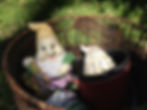
Everyday Sources of Story Ideas
Writers often think they need to scale mountains or survive dramatic upheavals to craft compelling stories. The truth is far more accessible: some of the most powerful narratives emerge from the ordinary moments that fill our daily lives. The key isn’t finding extraordinary experiences, it’s learning to see the extraordinary within the mundane. Or even the ordinary.
The Power of Overheard Conversations
Last Tuesday, I caught fragments of a conversation between two strangers talking about a librarian they knew who was retiring after forty years. One woman said: "She’d worked there so long, I wonder if she had any regrets about what she’d chosen.” Those words contained an entire universe: a life lived, choices made, people left behind. It turned into a story of introspection and reflection that became a powerful short story that I'm intending to enter into a writing competition.
Overheard conversations are goldmines because they’re unfiltered and real. Unlike dialogue we construct in our heads, these snippets carry authentic emotion and unexpected turns of phrase. The elderly man arguing with customer service about an expired warranty isn’t just frustrated. He’s clinging to something that once made sense to him. The mother whispering into her phone about a friend she’d just lost, her grief palpable, is a mirror to all of us.
To capture these moments, I’ve learned to listen without judgment and write without immediate interpretation. The story isn’t always obvious in the moment. Sometimes it takes weeks for a overheard phrase to connect with another observation and suddenly bloom into something meaningful.
Forgotten Objects as Story Catalysts
Every forgotten object tells a story about interruption and I love them as sources of inspiration. Someone was using it, valued it, then life pulled them elsewhere. The reading glasses left on a park bench suggest a moment when someone was absorbed in a book, then called away by something more urgent. What was urgent enough to make them forget something they needed to see?
One day I was out walking and came across rubbish being thrown out – the “council collection” that happens in our area often. But I went out and took lots of photos of these things – dolls, toys pots, pans – all the things that come from an everyday existence. I wanted to put together a photographic exhibition on these but life got in the way, but the seed of a story stayed. I took the idea of a photographer shooting these object becoming possessed by them as a bit of an experiment in writing goth horror fiction. And it was great fun, taught me a lot about the genre and I really want to explore it more. Another one for a competition.

Objects become powerful when we consider not just who owned them, but who they’ve become separated from. The wedding ring in a pawn shop window, the handwritten recipe falling out of a used cookbook, the ticket stub used as a bookmark. Each represents a moment when someone’s world shifted, when what once mattered became something they could release.
Mining Daily Routines for Narrative Gold
Our routines reveal who we are and who we’re trying to become, and are also great sources to mine. The man who always slows down at the flower shop is negotiating with possibility. The woman who reorganizes her spice rack every Sunday afternoon isn’t just cleaning, she’s imposing order on the one corner of her life she can control.
I’ve found stories in my own mundane habits. Writing, making my tea, arranging my desk. All things that I can focus on but can also write about. They become the foundation for exploring how ritual creates the illusion of control.
Routines are particularly rich because they’re where character meets circumstance. What happens when someone’s routine is disrupted? What do they protect when everything else is falling apart?
Transforming Observation into Story
The bridge between mundane observation and compelling narrative is often emotional resonance. What feeling does this moment contain? What universal human experience does it reflect?
Stories emerge when we dig beneath the surface of ordinary moments to find the deeper currents running through them. The extraordinary was always there, waiting to be noticed. We just needed to learn how to look.
Your next story might be sitting in tomorrow’s commute, hiding in the conversation at the table behind you, or tucked inside the pocket of a jacket you haven’t worn in months. The mundane world is teeming with narrative possibility.
All it requires is a writer willing to pay attention.
Warmly, Des Brady/Writer. Occasional photographer. New goth writer.








